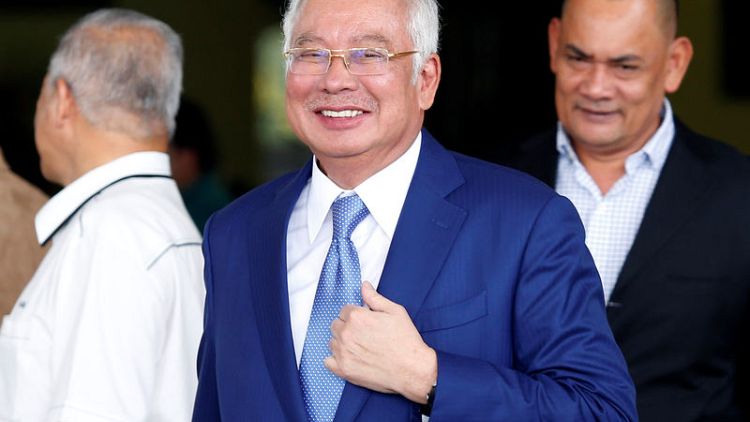By Rozanna Latiff
KUALA LUMPUR (Reuters) - Malaysian prosecutors on Wednesday said former prime minister Najib Razak abused his power to cover up the theft of hundreds of millions of dollars from the state fund 1MDB and used the fund for self-gratification.
On the opening day of the biggest trial in the 1MDB financial scandal, prosecutor Gopal Sri Ram said Najib used his position to evade justice, especially after news of the scandal broke in July 2015.
"He interfered with the course of investigation of the case which has come to be known as the 1MDB scandal," Gopal told the Kuala Lumpur High Court in his opening statement. "He took active steps to effect a cover-up of his criminal acts."
Malaysian and U.S. authorities have alleged that about $4.5 billion (£3.67 billion) was misappropriated from 1Malaysia Development Berhad (1MDB), co-founded by Najib in 2009.
Najib was voted out of power last year amid widespread public anger over the scandal, and has since been charged with 42 criminal offences linked to losses at 1MDB and other state entities. He has denied any wrongdoing and says the charges against him are politically motivated.
In his second trial on Wednesday, Najib faces 21 charges of money laundering and four charges of abuse of power for allegedly receiving illegal transfers of at least 2.3 billion ringgit (£447.12 million or $550.8 million) between 2011 and 2014.
The prosecution said Najib used 1MDB as a vehicle "to obtain gratification for himself".
MAN IN THE MIRROR
The prosecution argued that Najib had not acted alone, colluding on numerous occasions with fugitive financier Low Taek Jho, better known as Jho Low, to set up and carry out abnormal financial transactions "with undue haste".
Low, who faces criminal charges in Malaysia and the United States over his alleged central role in the 1MDB case, has consistently denied wrongdoing and his whereabouts are unknown.
"If you place the accused before a mirror, you will see Jho Low. And if you place Jho Low before a mirror, you will see the accused," Gopal said.
Najib's defence team has argued that he was misled by various individuals, particularly Low, in dealings related to 1MDB.
"He (Low) misled the bank, he misled 1MDB...so to say my client is the alter ego, I'd like to see them prove it," Najib's lawyer, Shafee Abdullah, told reporters outside the court.
Shafee also contested the prosecution's argument that Najib and Low had fabricated documents to state that $100 million in donations had come from an Arab donor, saying Najib "believed honestly" that the money had come from the king of Saudi Arabia.
GOLDMAN SACHS DEALS
Gopal told the court that Najib and Low had colluded to raise more than $5 billion to fund the acquisition of two energy companies, though part of the sum went to accounts linked to Low while Najib was paid more than 90 million ringgit ($21.48 million).
The funds raised include two $1.75-billion bond issuances arranged by Goldman Sachs, which netted the bank a total payout of $302.5 million in arranger's fees.
Goldman earned another $279 million as arranger of a $3-billion loan to fund a "sham" joint-venture project between 1MDB and Aabar Investments PJS to build the Tun Razak Exchange tower. Gopal said Najib ultimately received $681 million from the deal.
Goldman has appointed a team of Malaysian lawyers to monitor the trial, which continues on Thursday.
After the shock election loss, Najib and his wife Rosmah Mansor were barred from leaving Malaysia and scrutiny of their luxurious lifestyle uncovered nearly $300 million worth of goods and cash at properties linked to him.
Rosmah, known for her designer handbags and jewellery, has also been charged with corruption. She has pleaded not guilty.
Wednesday's proceedings began a day after the prosecution wrapped up its case in Najib's first trial, where he is accused of illegally receiving $10 million from SRC International, a former 1MDB unit.
Lawyers are expected to submit closing arguments in that case in October, with the judge to rule by Nov. 11.
(Reporting by Rozanna Latiff; Writing by Joseph Sipalan; Editing by Michael Perry and Clarence Fernandez)
